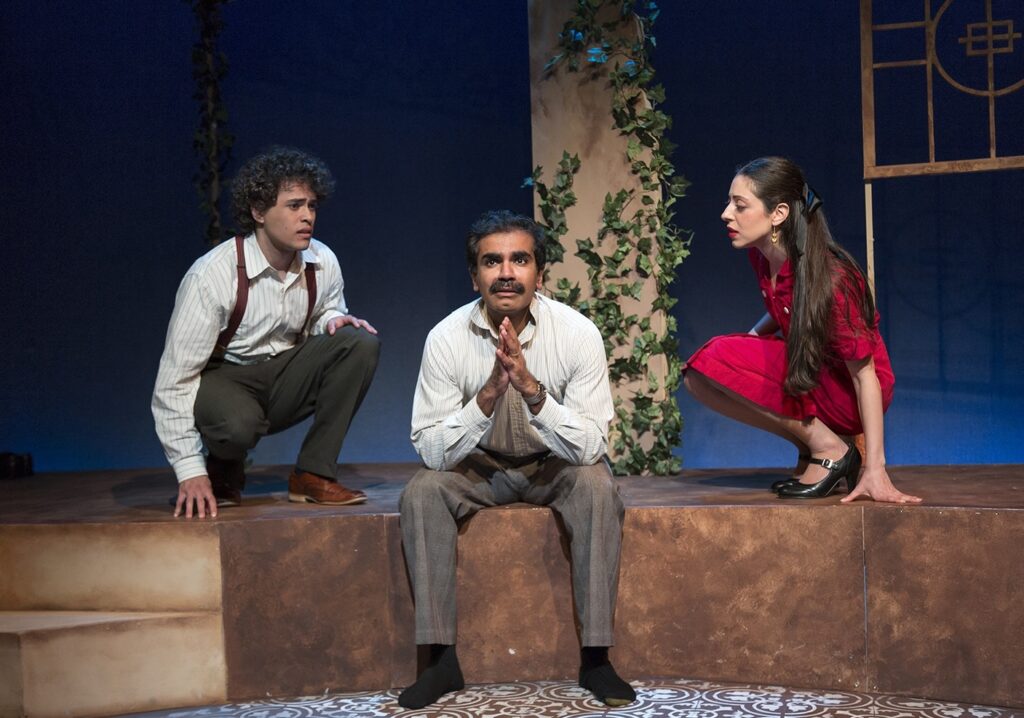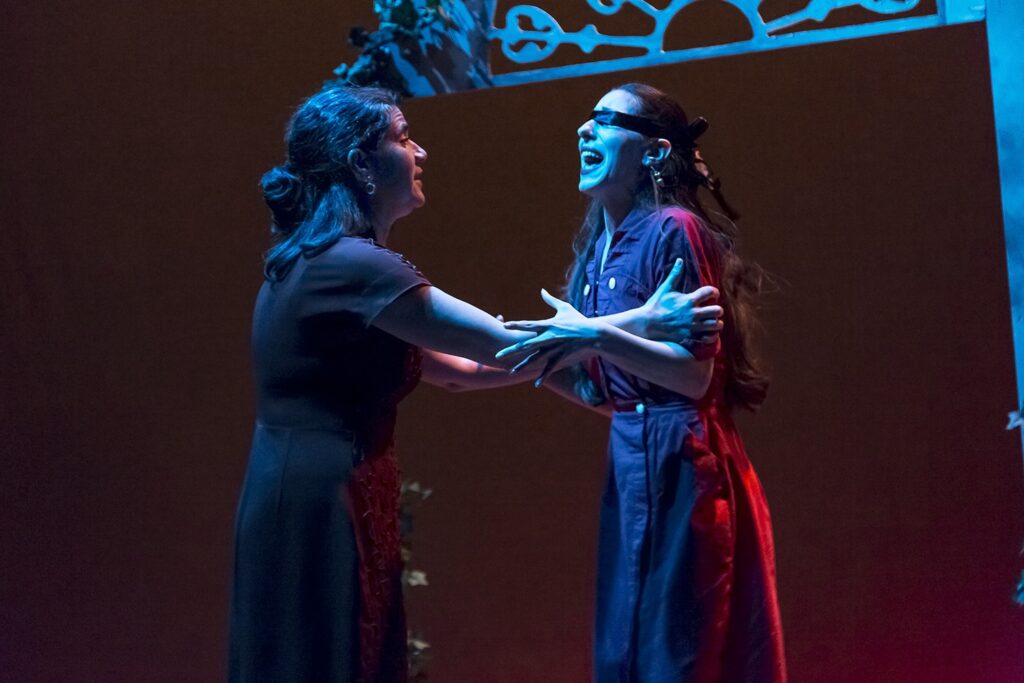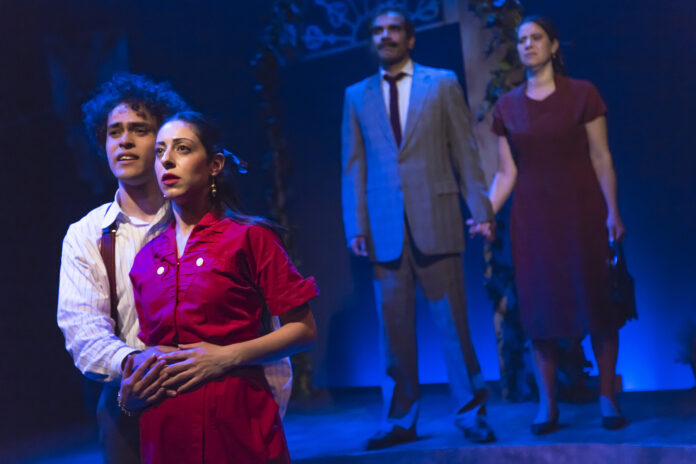I’ll tell you this much, dear reader: I hadn’t planned on seeing two Golden Thread full-length productions within days of one another (after NCTC co-production The Tutor), even during Arabic Heritage Month. I also didn’t expect to review a show about forced displacement as I personally scramble to find a full-time job and a new place to live, lest I have to leave the Bay Area. Finally, it wasn’t until days before that I realized that this Golden Thread opening night fell on Tax Day. The latter certainly wasn’t lost on company AD Sahar Assaf, whose opening curtain speech condemned the fact that our taxes are specifically funding Israel’s War on Gaza, despite strong opposition from the US public. In fact, it’s the reason GT dedicated their entire season to sharing Palestinian stories.
Naomi Wallace and Ismail Khalidi’s new adaptation of Ghassan Kanafani’s novella Returning to Haifa (West Coast premiere through May 4 at Potrero Stage, SF) takes place in the shadow of The Six-Day War in 1967. Israel, in a gesture of power, has temporarily opened their borders to Palestinians displaced by the Nakba some 20 years prior. One such couple is Said and Safiyya (Lijesh Krishnan and Amal Bisharat, respectively), who are delighted to return, but are haunted by the lingering ghosts in their former hometown of Haifa—ghosts that include their younger selves (Jacob Henrie-Naffaa and Diala Al-Abed).
Like time travelers, they return to their former house, now occupied by a Polish-Jewish family. They’re welcomed warmly by matriarch Miriam (Michelle Navarette), but not so much by local Israeli soldier Dov (also Henrie-Naffaa). Dov sees the returning couple as parasites who have no business infecting “the Holy Land,” even if the two were there first. For Said and Safiyya, it’s a struggle to find comfort in their once-sacred place, now overtaken by strangers.

There’s a gripping scene near the middle of the play where Miriam explains that she grew up with the idea of “Israel” being as much a fantasy land as any other fairy tale. She never put much credence into her elders’ declarations of one day going there. As resistant as our couple are to any extensive socializing with this woman, they clearly relate to someone who’s had their homeland and possessions taken from them by an oppressive military force. She isn’t one to regurgitate Zionist propaganda, nor is she a smug asshole the way Dov will be later in the scene (shout-out to Henrie-Naffaa for making Dov the perfect level of insufferable). But that doesn’t change the fact that, as gleaned in a few following lines, they aren’t the same.
Watching the play would be a discomforting experience even without the current attempted genocide in Gaza, because it puts a well-due focus the imperialist tactics victim-blaming and self-victimization. Said and Safiyya arrive in Haifa leaving behind their young son, and it isn’t lost on them that Dov or one of his comrades may kill the boy—something Said explicitly points out. Dov, who’s affectionate toward Miriam, only sees Palestinians as weak for not staying to defend their land to the last breath. He either doesn’t know or care why they didn’t push back against their oppressors, only that they lost and now want to take what Israelis think is rightfully theirs.
If that sounds familiar, it should.
Director Samer Al-Saber revels in the “boiling kettle” moments of tension presented in the script. As soon as our couple return to their old home, there’s an unbreakable air of anxiety putting one constantly on edge that something terrible could happen at any minute. It’s exacerbated by the knowledge that if anything were to happen, Said and Safiyya would be on the receiving end of the worst of it. We root for them just as much as we fear for their lives, which isn’t all that different from reading the news about Palestine day after day.

Al-Saber is aided in his magical realist world-building by a Carlos Aceves set that seems almost like Dalí’s The Persistence of Memory in its abstract pieces of free-floating Middle Eastern architecture. Sound design is by Derek Schmidt, who knows the importance of the role when our couple, both in their youth and as seniors, seem to constantly live within earshot of explosions and gunfire. Al-Saber brings all of these elements together best in a tense scene in which our elder couple literally walk their younger selves through the harrowing escape from Haifa as the British-backed forces destroy the historical city. The elders blindfold the young, as if to spare them the terrifying imagery of what’s happening around them, but the horror resonates with both the past and present couple. It’s chilling sequence from an already gripping play.
It had been a while since I’d been to the Potrero Stage. I knew they had a mask-required show coming on April 21 and a weeklong video-on-demand screening starting May 5, but I still chose to brave opening night knowing it was mask-optional. (After all, I don’t know for sure how long I’ll be here myself.) The full house had maybe five masked patrons, myself included. With no intermission to the show, the CO² levels on my Aranet4 were up to 1682ppm by show’s end. Odd that I think of a number like that as “low” these days.
Much like the George Floyd protests of 2020 (or even the Women. Life. Freedom. protests in Iran of 2022), there’s a great hope that the current pushback against the War on Gaza—pushback that has included the United Nations and the International Court of Justice—will result in permanent change for the better. One would hope, but those of on the receiving end oppression have learned to not get hopes up too soon. It’s been three-quarters of a century since Al Nakba, but the harm it’s done would be evident even without Israel’s current attacks.
The characters of Returning to Haifa are exemplary of both the ghosts of Palestinians killed in the occupation, as well as the resilience of those who never gave up the hope of returning home. It’s nearly 100 minutes of almost unbearable tension, but when you compare that to the 75 years real Palestinians have gone through, the play is almost a brief catharsis.
RETURNING TO HAIFA runs through May 4 at the Potrero Stage, SF. Tickets and further info here.







